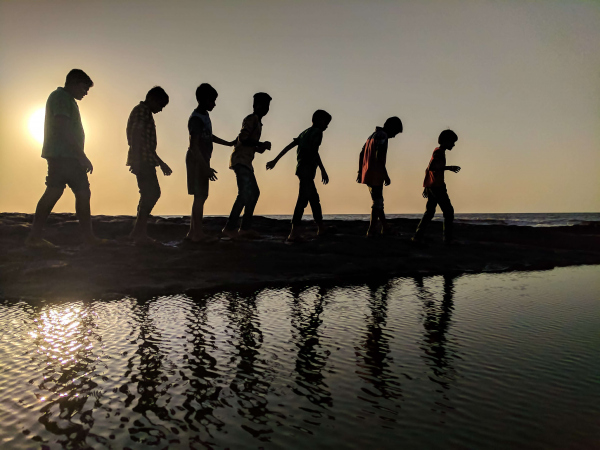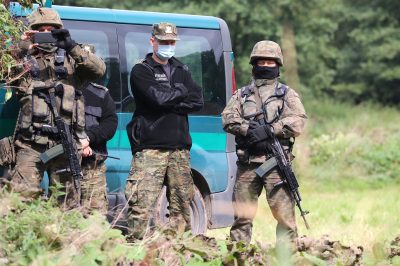
HFHR: Poland has not yet complied with the recommendations of the ECtHR in the case Bistieva and others v. Poland
In the 2018 case Bistieva and Others v. Poland, the European Court of Human Rights found that the detention of a family with three minor children in a guarded centre for foreigners for more than five months violated the right to respect for private and family life guaranteed by Article 8 of the European Convention on Human Rights.
The Court considered that the protection of the best interests of the child cannot be limited to placing children with their parents in detention centres with a regime similar to that of a prison. According to the Court, the Polish authorities must ensure that the detention of families with children is always a measure of last resort. In Bistieva and Others v. Poland, the Court found that the Polish authorities had not done everything they should have done to ensure that the family was not detained. The authorities did not make any effort to find non-custodial measures alternative to detention that would, on the one hand, guarantee that the foreigners could stay in Poland and, on the other hand, protect the best interests of the children and the family, as required by international law (including the UN Convention on the Rights of the Child or the EU Charter of Fundamental Rights).
The Polish government has always argued that it has implemented the Court's recommendations by introducing alternative measures to detention in the Foreigners Act and the Act on granting protection to foreigners on the territory of the Republic of Poland in 2014. These measures can be applied in the cases mentioned in both laws by both the Border Guard and the common courts instead of the placement of foreigners in a guarded centre. Alternative measures include the payment of a monetary bond, an order to appear before a certain authority within certain time limits or an order to reside in a certain place.
The Helsinki Foundation for Human Rights does not agree with the government's position.
In a statement submitted to the Committee of Ministers of the Council of Europe on 16 June 2023, the Foundation pointed out that the provisions introducing alternative measures to detention in Polish legislation allow for a wide margin of discretion in their application and do not always directly oblige the authorities or courts deciding on detention to be guided by the best interests of the child. Therefore, in practice, immigration detention is not a measure of last resort and is often imposed or extended arbitrarily. As evidence, the Foundation cited statistical data that the government had previously provided to the Court. These showed that in 2021, during the crisis on the Polish-Belarusian border, 571 children were placed in guarded centres, while non-custodial measures were only applied to 37 minors. The latter figure represents only 6% of all children detained by the Border Guard in 2021.
The HFHR considers (and has informed the CoE Committee of Ministers) that placement in a guarded centre is generally not in the best interests of the child and undoubtedly has a negative impact on their psychophysical development. Guarded centres do not guarantee adequate access to medical or psychological care, nor can they ensure that the right to education is exercised for all children. The Foundation also recalled that the standards prevailing in the centres have been repeatedly criticised, including by the National Mechanism for the Prevention of Torture and the Ombudsman (e.g. in a letter to the presidents of the regional courts dated 25 January 2022 (KMP.572.1.2021.PK)[1], in which the Ombudsman recalls that the detention of children must be treated as a last resort and that, if it is necessary to apply some security measures, non-custodial measures should be chosen by default as an alternative to detention.
HFHR files an amicus curiae brief in an ECtHR case, V.M. and Others v. Poland (no. 40002/22)
On 19 June 2023, the Foundation submitted an amicus curiae brief to the European Court of Human Rights in the case of V.M. and Others v. Poland, which, as in the Bistieva case, concerns the placement of a family with minor children (in this case a mother and her two minor children) in a guarded centre for foreigners.
In the V.M. case, the Foundation put forward arguments similar to those it had previously put forward in its position on the execution of the Bistieva and Others judgment. The Foundation has again stated that the courts make arbitrary use of detention and often disregard or misunderstand the concept of the best interests of the child in cases involving deprivation of liberty.
According to the Foundation, the V.M. case is an example of a misunderstanding of the best interests of the child. In one of the decisions handed down in this case, a regional court ruled that the placement of children in a guarded centre with a parent serves to “protect their rights and interests” and is justified by the “principle of family integrity and the welfare of minors”. However, according to the HFHR, the court overlooked the fact that applying a non-custodial measure as an alternative to detention to all family members would also respect the integrity of the family, and only then would the interests and welfare of the minors be adequately protected.
[1] https://bip.brpo.gov.pl/pl/content/rpo-sady-migranci-strzezone-osrodki-rodziny-dzieci


